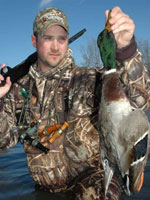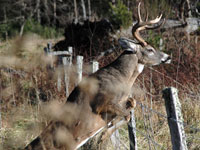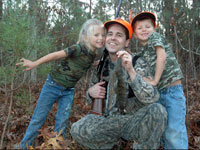How to Find Deer Land to Hunt
Decide Who Knows the Most Land and the Most People
 Editor’s
Note: Some years ago I almost dropped the telephone
receiver when I heard the words, "The landowner
has sold the land, and our hunting lease has been cancelled."
I'd called the secretary of our hunting club to let
him know that I planned to go to our hunting camp three
weeks before deer season started to check several of
my stand sites and get ready for the opening weekend
of bow season. I wanted to scout the areas where I'd
taken bucks before, cut shooting lanes and make sure
that the deer fed on the same nut trees they had in
the past. I enjoy scouting for deer because I consider
it the true essence of the sport of hunting. Scouting
means learning where the deer feed and bed and which
trails they travel on and then predicting where a deer
may appear. When you hunt, you actually climb into your
tree stand and wait o Editor’s
Note: Some years ago I almost dropped the telephone
receiver when I heard the words, "The landowner
has sold the land, and our hunting lease has been cancelled."
I'd called the secretary of our hunting club to let
him know that I planned to go to our hunting camp three
weeks before deer season started to check several of
my stand sites and get ready for the opening weekend
of bow season. I wanted to scout the areas where I'd
taken bucks before, cut shooting lanes and make sure
that the deer fed on the same nut trees they had in
the past. I enjoy scouting for deer because I consider
it the true essence of the sport of hunting. Scouting
means learning where the deer feed and bed and which
trails they travel on and then predicting where a deer
may appear. When you hunt, you actually climb into your
tree stand and wait o n
the shot. But this year instead of scouting for a place
to put my tree stand, I had to scout for new land to
hunt. n
the shot. But this year instead of scouting for a place
to put my tree stand, I had to scout for new land to
hunt.
I felt like Sherlock Holmes, the legendary detective
from England's Scotland Yard, as I asked myself, "Who
in the county would know the most rural landowners,
how much land they controlled, and whether or not they
would allow someone to hunt for free, lease their land
or pay a day-usage fee?" Here's the list I made:
* sheriff's deputies and conservation officers.
* the banker in any rural county and many urban areas.
Many of these landowners have borrowed money from the
banker to plant crops, improve their land, fence their
land, buy feed for cattle or borrow money to buy additional
land. Because the banker must get to know people very
well before he loans them money, more than likely he
 knows
their attitudes about hunting and hunters. Become the
banker's friend. Hopefully he can act as a go-between
or vouch for you and introduce you to a landowner. knows
their attitudes about hunting and hunters. Become the
banker's friend. Hopefully he can act as a go-between
or vouch for you and introduce you to a landowner.
* the newspaper man/lady who delivers the daily paper
to rural communities. Often they'll have information
about how much land these people own and their attitudes
toward hunters. If the paperman delivers the morning
paper, he often will observe deer crossing the road,
going from their feeding to their bedding areas. If
he also delivers the afternoon paper, he'll frequently
spot deer standing out in fields or feeding in fields
just before dark. He can tell you about the size of
bucks he's seen on that land as he runs his route. When
in college, I became friends with an older student who
lived in the same married-student apartments with me.
Before class each day, he delivered morning papers from
a nearby urban center to the rural region surrounding
our university. He had permission to hunt and fish on
more land than we could cover in our four college years,
even though we hunted three afternoons a week and all
weekend.
* the rural letter  carrier/mailman,
who may see deer as he travels his route. carrier/mailman,
who may see deer as he travels his route.
* the rural barber, who knows the men of the community.
Go to College:
Many hunters fail to realize that when alumni of colleges
die, they'll often leave their lands or portions of
their lands to the college or university they have attended.
Some colleges have vast land holdings while other colleges
may own only a few hundred acres. Most hunters never
think to go to the land department of a college or university
and look at the possibilities of leasing land to hunt.
Although you may not find large blocks of woodlands
contiguous to each other, you may pinpoint several small
tracts available for lease during hunting season.
Tomorrow: Check with the Army
|
